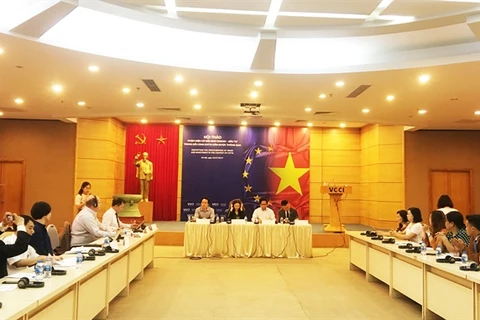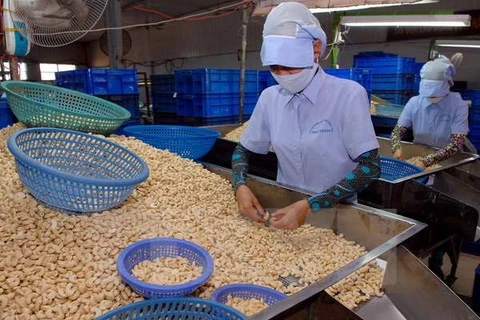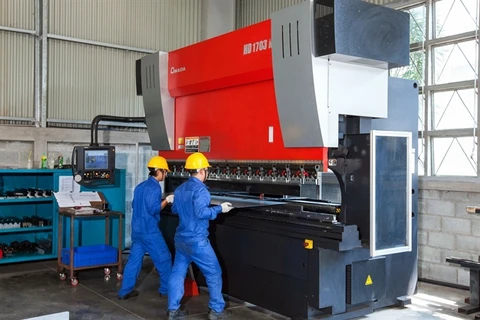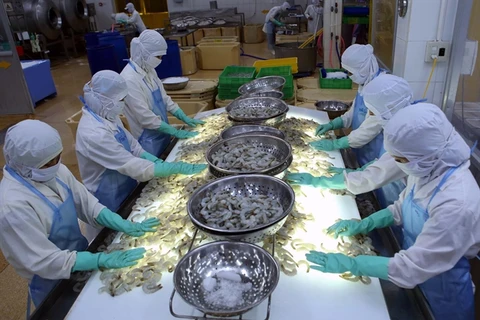Hanoi (VNA) – The successful negotiations and signing of the free trade agreements with big partners will heighten Vietnam’s image in the world stage, creating a new push for the economic growth in the long term, Minister of Industry and Trade Tran Tuan Anh has said, refering to the trade deals recently inked with the EU.
Vietnam and the EU signed the EU-Vietnam Free Trade Agreement (EVFTA) and EU-Vietnam Investment Protection Agreement (EVIPA) at a ceremony in Hanoi on June 30.
The negotiations of the EVFTA concluded after six years. The deal, expected to be an engine for growth, would open up opportunities for Vietnamese enterprises to enter a market of 508 million consumers with a combined GDP of about 18 trillion USD, Anh told the Vietnam News Agency.
He described the EVFTA as a comprehensive, high-quality agreement that ensures a balance of benefits for both Vietnam and the EU, saying it is important to Vietnamese economy as it is hoped to make Vietnamese goods and services more competitive in the EU market.
Almost all Vietnam’s exports to the EU will see custom duties removed gradually following a short roadmap. It is the highest commitment so far from a partner to Vietnam in a FTA, he noted.
In the trade, service and investment areas, Vietnam’s commitments in the EVFTA are higher than those in the World Trade Organisation (WTO), in parellel with the EU’s highest commitments in the FTAs it signed recently, the minister said.
The trade deal does not include the near complete removal of tariff barriers but is also very comprehensive, covering a wide range of areas, from trade in goods, public procurement, trade defence and intellectual property. Therefore, he expected the agreement would not only boost exports from both directions but also help Vietnam improve its competitive edges and join new value chains.
Once the EVFTA takes effect, Vietnam will grant registration and protection to over 160 EU Geographical Indications (GIs) while the EU will do the same with 39 Vietnamese GIs.
The agreement also contains chapters in competition, state-owned enterprises, sustainable development, and cooperation and capacity building. These contents are consistent with Vietnam’s legislation, laying legal foundation for the two sides to foster partnership and the development of bilateral trade and investment, he noted.
Anh moved on to said that the EVFTA still needs to be ratified by parliaments of each side, and that Vietnam will have to go through another process of ratification to officially make it effective. Whether this process can be short or lengthy, it depends much on the efforts of both Vietnam and the EU, he added.
The EVFTA requires the EU to give its consent while the EVIPA will take longer to come into force due to the requirement for member states’ ratification.
All the EU member states have approved the signing of both the EVFTA and the EVIPA, which would certainly smooth the way for the ratification, he said.
He believed with the spirit and efforts both sides have demonstrated in the negotiation process, concerned agencies of Vietnam and the EU will complete the ratification at the soonest possible time.
Vietnam remains the EU’s second largest trading partner within the ASEAN. The two-way trade hit 55 billion USD last year with Vietnam mostly exporting to the EU telephone sets, electronic products, footwear, textiles and clothing, coffee, rice, seafood and furniture.
Under the EVFTA, Vietnam’s exports to the EU market are forecast to rise 4 – 6 percent compared to a non-FTA trade relation. Its exports are expected to touch 75 billion USD in 2028. –VNA
VNA
























